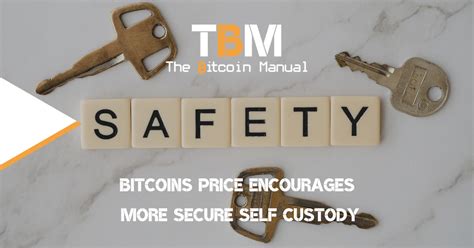Bitcoin: Industry Standard for Trustless Self-Custody
When it comes to storing and managing their cryptocurrencies, many individuals opt for centralized exchanges (CEXs) to store their digital assets. However, this approach has its drawbacks. One of the main concerns is the risk of loss or confiscation by the exchange itself, especially if it goes out of business. This is where trustless self-custody solutions come in.
What is Trustless Self-Custody?
Trustless self-custody refers to a system where an individual stores their cryptocurrencies in their own wallet, without relying on a centralized authority or intermediary. This approach offers significant benefits, including complete control and ownership of the assets, as well as increased security against loss or confiscation.
Why Self-Custody?
Unlike traditional CEX methods, trustless self-custody solutions offer several advantages:
- Full Control: By storing your Bitcoin in your own wallet, you have full control over your digital assets, without a middleman.
- Security: Self-custody solutions typically employ robust security measures, such as multi-factor authentication and cold storage, to protect your assets from theft or loss.
- Flexibility: You can easily transfer, send, and receive Bitcoin across multiple networks and exchanges, without relying on a centralized authority.
- No Centralized Exchange Risk: If the CEX you are using goes out of business, your assets are safe, as they are stored in your wallet.
Industry Standard Solutions for Self-Custody
Several industry standard solutions have emerged to support trustless self-custody:
- Hardware Wallets
: Devices such as Ledger, Trezor, and KeepKey provide secure storage for cryptocurrencies using physical devices.
- Paper Wallets: A simple, low-tech solution that generates a unique digital wallet on paper, allowing users to store their assets digitally.
- Online Self-Custody Solutions: Platforms such as Coldcard, BitAccess, and Trust Wallet offer online self-custody solutions that allow users to manage their assets securely.
Hardware Wallets: The Industry Standard
When it comes to trustless self-custody, hardware wallets are generally considered the industry standard. These devices utilize advanced security features, such as:
- Cold Storage: Storing Bitcoin on a physical device, away from any electrical sources.
- Secure Enclave: A dedicated chip inside the wallet that stores sensitive information.
- Passphrase: A complex password or phrase used to secure access to the device.
Trustless Self-Custody Best Practices
To ensure maximum security and flexibility with trustless self-custody, follow these best practices:
- Use a Hardware Wallet: Invest in a trusted hardware wallet that meets industry standards.
- Protect Your Password: Use strong, unique passwords or passphrases to access your device.
- Store Your Device Safely

: Keep your device and storage media (e.g., paper wallets) safe and out of the reach of unauthorized individuals.
Conclusion
Trustless self-custody solutions offer a robust alternative to traditional centralized exchanges, providing complete control, security, and flexibility for managing your digital assets. By being aware of available industry-standard solutions, such as hardware wallets, and following best practices, users can enjoy a safer and more secure way to store their cryptocurrency.
Leave a Reply